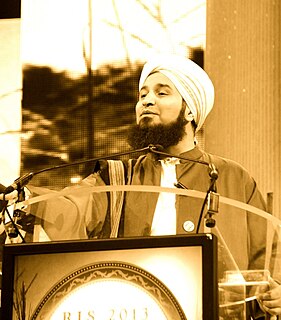Related Research Articles
Sheikh Shakhbut bin Dhiyab Al Nahyan was the Ruler of the Emirate of Abu Dhabi from 1793 to 1816, now part of the United Arab Emirates (UAE).

The Shadhili Tariqa is a Sufi order of Sunni Islam founded by Abul Hasan Ali ash-Shadhili in the 13th century and is followed by millions of people around the world. Many followers of the Shadhiliya are known as Shadhilis, and a single follower is known as Shadhili.

Imam Sayyid Abd Allah ibn Alawi al-Haddad was a Yemeni Islamic scholar. He lived his entire life in the town of Tarim in Yemen's Valley of Hadramawt and died there in 1720 CE. He was an adherent to the Ashari Sunni Creed of Faith (Aqeedah), while in Islamic jurisprudence (Fiqh), he was a Sunni Muslim of Shafi'i school.

The Alawi Sheikhdom, or Alawi — was a Sheikhdom located in the Aden region of southwestern Yemen. Its capital was Al Qasha. The state was abolished in 1967 with the independence of the People's Republic of South Yemen.

Al-Sayyid Muhammad al-Hasan bin ‘Alawi bin Abbas bin ‘Abdul Aziz (1944–2004), also knowing as Muhammad ibn Alawi al-Maliki, was a Sufi of contemporary times from Saudi Arabia.
Al Qasha was the capital of the Alawi sheikhdom in south Yemen. It is a small city bordering northern Yemen.

Maulana Hasanuddin was the second ruler of the Banten Sultanate, following the mysterious Sunan Gunungjati when he left to found Cirebon. Hasanudin reigned from c. 1552 to 1570.
Ahmad al-Muhajir also known as Al-Imām Aḥmad bin ʻIsa was an Imam Mujtahid and the progenitor of Ba 'Alawi sada group which is instrumental in spreading Islam to India, Southeast Asia and Africa. He was the son of ‘Isa the son Muhammad the son of 'Ali al-Uraidhi who was the fourth son of Imam Ja'far as-Sadiq, a fifth generation descendant of Ali bin Abu Talib and Fatimah bint Muhammad, the daughter of Muhammad.

The Ba'Alawi tariqa, also known as the Tariqa Alawiyya is a Sufi order centered in Hadhramawt, Yemen, but now spread across the Indian Ocean rim along with the Hadhrami diaspora. The order is closely tied to the Ba'Alawi sadah family.
Abdallah bin Alawi was the Sultan (?Shirazi) of and on Anjouan island from 1816 to 1832, and then again from 1833 to his death in 1836. He was succeeded first by Ali bin Salim, and finally by Saidi Alawi bin Abdallah.

Yusuf bin Alawi bin Abdullah is an Omani politician. He was the Sultanate of Oman's Minister Responsible for Foreign Affairs. It is important to clarify that "Ministers in Responsibility" were previously appointed as the Sultan was intended to hold the official position of "Minister of Foreign Affairs" himself.

The Ba 'Alawi sadah or Sadah Ba 'Alawi are a group of Hadhrami Sayyid families and social group originating in Hadhramaut in the southwest corner of the Arabian Peninsula. They trace their lineage to Sayyid al-Imam Ahmad al-Muhajir bin Isa ar-Rumi born in 873 (260H), who emigrated from Basra to Hadhramaut in 931 (320H) to avoid sectarian violence, including the invasion of the Qaramite forces into the Abbasid Caliphate.

Habib Ali Zain al-Abidin al-Jifri is a Sunni Sufi Islamic scholar and spiritual educator located in the United Arab Emirates. He is the founder of Tabah Foundation, a research institute based in Abu Dhabi, UAE.
Ali al-Uraidhi ibn Ja'far al-Sadiq, better known simply as Ali al-Uraidhi, was the son of Ja'far al-Sadiq and the brother of Isma'il, Musa al-Kadhim, Abdullah al-Aftah, and Muhammad Al-Dibaj. He was known by the title al-Uraidhi, because he lived in an area called Uraidh, about 4 miles from Medina. He was also known by the nickname Abu Hasan. He was a great Muslim scholar.
Habib Swaleh or Salih bin Alawi Jamal al-Layl (1853-1936) was an Islamic scholar who resided in Lamu, Kenya.

Habib Umar bin Hafiz is a Yemeni Sunni Islamic scholar, teacher, founder and the dean of Dar al-Mustafa Islamic seminary. He also a member of the Supreme Advisory Council for the Tabah Foundation in Abu Dhabi.
Syarif Abdur Rahman al-Qadri was the founding father and the first Sultan of Pontianak, Indonesia.

Yang Dipertuan Besar Syarif Kasim Abdul Jalil Saifuddin or Sultan Syarif Kasim II was the 12th and last sultan of the Sultanate of Siak Sri Indrapura. He was crowned as the sultan at the age of 23 succeeding his father Sultan Syarif Hasyim. Sultan Syarif Kasim II was a supporter of the independence struggle in Indonesia. After Indonesia proclaimed independence, he ceded Siak Sultanate to be part of united Indonesia, and he contributed his wealth of 13 million guilders. for a number of republican government causes. Together with the Sultan of Serdang, he also tried to persuade other kings of East Sumatra to join the republic cause.

Israel–Oman relations are the bilateral relations between the State of Israel and the Sultanate of Oman. In line with the Arab League position in relation to Israel, Oman does not officially recognize the state of Israel and took part in the boycott of Israel during much of the 20th century.

Oman–Syria relations refer to the relationship between the Sultanate of Oman and the Syrian Arab Republic. Oman has an embassy in Damascus; while Syria has an embassy in Muscat. Both are members of the Arab League, and despite the ongoing civil war occurring in Syria, Oman has not closed its embassy in Syria and both countries maintain diplomatic relations, in sharp contrast to other Arab states of the Persian Gulf who have cut off diplomatic ties with Syria and closed their embassies.
References
- ↑ "Countries Ci-Co". www.rulers.org. Retrieved 29 May 2020.